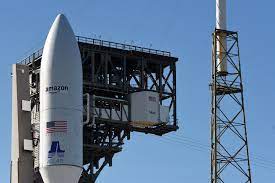Amazon’s Project Kuiper, a satellite broadband initiative aimed at providing internet access from low Earth Orbit (LEO), has launched two prototype satellites. These satellites were deployed at an altitude of 311 miles (500 kilometers) above Earth by an Atlas V rocket from Cape Canaveral Space Force Station in Florida. The successful launch marked a major milestone for Project Kuiper, which plans to deploy more than 3,200 satellites over the next six years to provide broadband internet access.
With this launch, Amazon has officially joined the race to build massive constellations of satellites to provide global internet connectivity — a move that puts the tech company in direct competition with SpaceX’s Starlink.
The Kuiper System consists of LEO broadband satellites, customer terminals, and a ground-based communications network. The Protoflight mission aims to test all these components along with the teams and systems that manage them. Amazon’s first production satellites are scheduled for launch in the first half of 2024, with beta testing for early commercial customers expected to begin by the end of 2024.

While Amazon has not shared extensive technical details about the satellites, it appears to be taking a vertically integrated approach similar to SpaceX’s Starlink. However, experts suggest that Amazon’s long-term plan should involve building a constellation based on 3GPP 5G non-terrestrial network standards. This approach would allow Amazon to benefit from a wider ecosystem of innovation and industry best practices, enable integration with terrestrial networks, and cover a broader range of use cases, ultimately delivering broadband services to the mass market.
Amazon’s Project Kuiper is competing with other satellite internet providers like SpaceX’s Starlink in the race to provide high-speed internet access to underserved and remote areas around the world.




